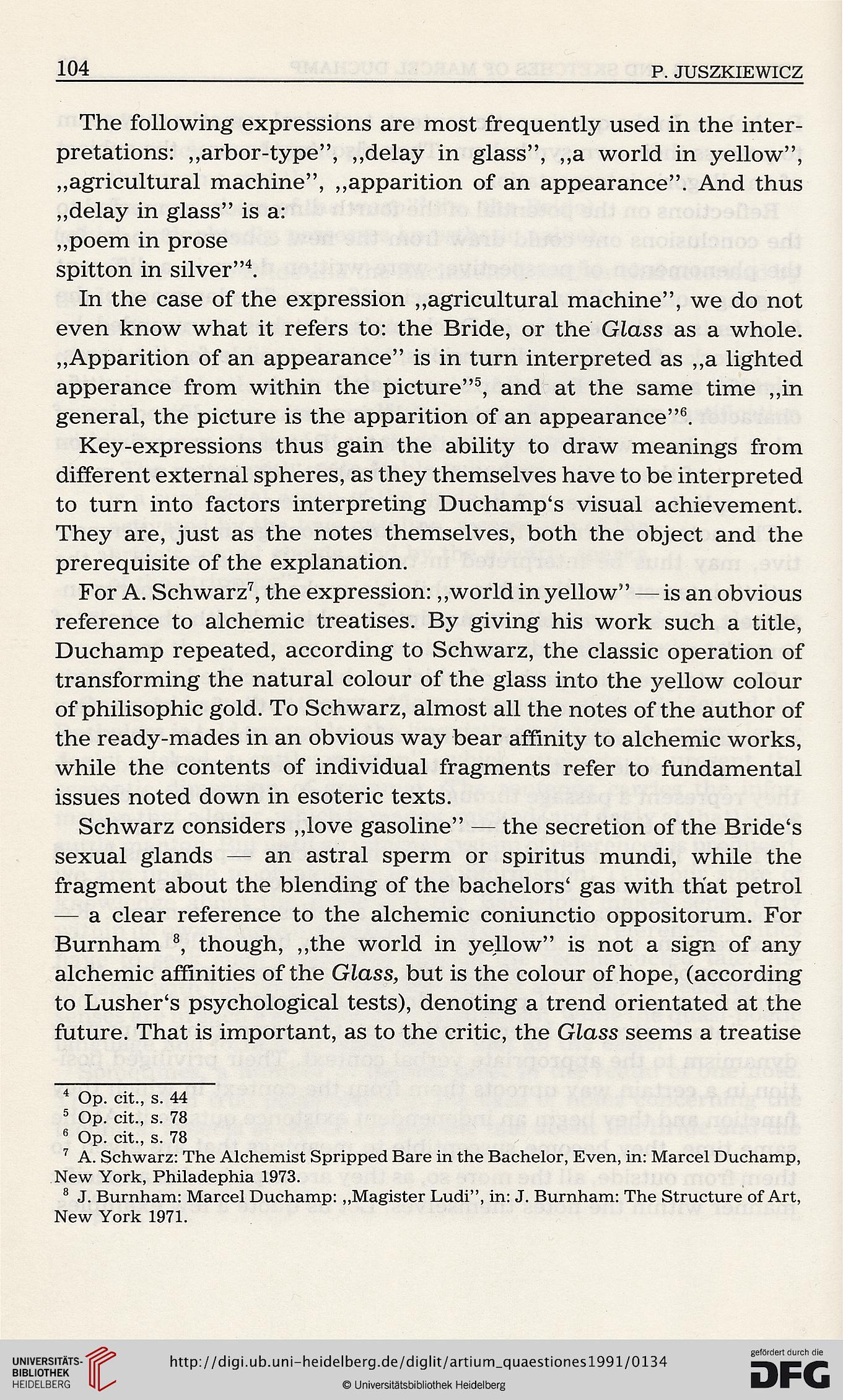104
P. JUSZKIEWICZ
The following expressions are most frequently used in the inter-
pretations: ,,arbor-type", ,.delay in glass", ,,a world in yellow",
„agricultural machine", „apparition of an appearance". And thus
„delay in glass" is a:
„poem in prose
spitton in silver"^.
In the case of the expression „agricultural machine", we do not
even know what it refers to: the Bride, or the Glass as a whole.
„Apparition of an appearance" is in turn interpreted as ,,a lighted
apperance from within the picture"^, and at the same time „in
general, the picture is the apparition of an appearance"^.
Key-expressions thus gain the ability to draw meanings from
different external spheres, as they themselves have to be interpreted
to turn into factors interpreting Duchamp's visual achievement.
They are, just as the notes themselves, both the object and the
prerequisite of the explanation.
For A. Schwarz^, the expression: „world in yellow" — is an obvious
reference to alchemic treatises. By giving his work such a title,
Duchamp repeated, according to Schwarz, the classic operation of
transforming the natural colour of the glass into the yellow colour
of philisophic gold. To Schwarz, almost all the notes of the author of
the ready-mades in an obvious way bear affinity to alchemic works,
while the contents of individual fragments refer to fundamental
issues noted down in esoteric texts.
Schwarz considers „love gasoline" — the secretion of the Bride's
sexual glands — an astral sperm or spiritus mundi, while the
fragment about the blending of the bachelors' gas with that petrol
— a clear reference to the alchemic coniunctio oppositorum. For
Burnham though, „the world in yellow" is not a sign of any
alchemic affinities of the Glass, but is the colour of hope, (according
to Lusher's psychological tests), denoting a trend orientated at the
future. That is important, as to the critic, the Glass seems a treatise
^ Op. cit., s. 44
s Op. cit., s. 78
s Op. cit., s. 78
^ A. Schwarz: The Alchemist Spripped Bare in the Bachelor, Even, in: Marcel Duchamp,
New York, Philadephia 1973.
^ J. Burnham: Marcel Duchamp: „Magister Ludi", in: J. Burnham: The Structure of Art,
New York 1971.
P. JUSZKIEWICZ
The following expressions are most frequently used in the inter-
pretations: ,,arbor-type", ,.delay in glass", ,,a world in yellow",
„agricultural machine", „apparition of an appearance". And thus
„delay in glass" is a:
„poem in prose
spitton in silver"^.
In the case of the expression „agricultural machine", we do not
even know what it refers to: the Bride, or the Glass as a whole.
„Apparition of an appearance" is in turn interpreted as ,,a lighted
apperance from within the picture"^, and at the same time „in
general, the picture is the apparition of an appearance"^.
Key-expressions thus gain the ability to draw meanings from
different external spheres, as they themselves have to be interpreted
to turn into factors interpreting Duchamp's visual achievement.
They are, just as the notes themselves, both the object and the
prerequisite of the explanation.
For A. Schwarz^, the expression: „world in yellow" — is an obvious
reference to alchemic treatises. By giving his work such a title,
Duchamp repeated, according to Schwarz, the classic operation of
transforming the natural colour of the glass into the yellow colour
of philisophic gold. To Schwarz, almost all the notes of the author of
the ready-mades in an obvious way bear affinity to alchemic works,
while the contents of individual fragments refer to fundamental
issues noted down in esoteric texts.
Schwarz considers „love gasoline" — the secretion of the Bride's
sexual glands — an astral sperm or spiritus mundi, while the
fragment about the blending of the bachelors' gas with that petrol
— a clear reference to the alchemic coniunctio oppositorum. For
Burnham though, „the world in yellow" is not a sign of any
alchemic affinities of the Glass, but is the colour of hope, (according
to Lusher's psychological tests), denoting a trend orientated at the
future. That is important, as to the critic, the Glass seems a treatise
^ Op. cit., s. 44
s Op. cit., s. 78
s Op. cit., s. 78
^ A. Schwarz: The Alchemist Spripped Bare in the Bachelor, Even, in: Marcel Duchamp,
New York, Philadephia 1973.
^ J. Burnham: Marcel Duchamp: „Magister Ludi", in: J. Burnham: The Structure of Art,
New York 1971.





